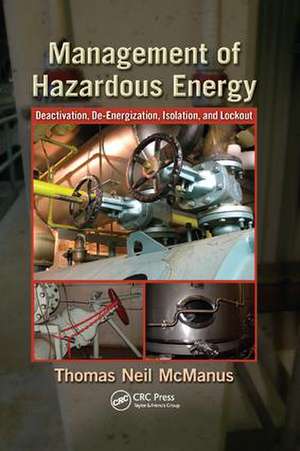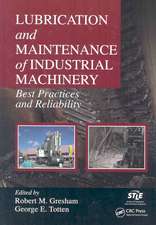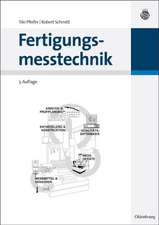Management of Hazardous Energy: Deactivation, De-Energization, Isolation, and Lockout
Autor Thomas Neil McManusen Limba Engleză Paperback – 22 noi 2017
Written in plain English with a minimum of jargon, this book provides safety professionals with the knowledge they need to interact with specialists, designers, and engineers to ensure that appropriate and necessary protocols and safety practices and tools are put into place for assessing the dangers and steps taken to eliminate or control exposure to hazardous energy when needed. Approaching the subject from the bottom up, the author starts at the workplace level, to ensure that the right actions happen for the right reasons.
The book explains a protocol for describing the flow of energy, including transformation and/or storage; for capturing the logic of decisions about control, including failure analysis and contingency planning; and ultimately for creating procedures that are technically sound and defensible. Creating simple procedures for ensuring worker safety and regulatory compliance, the book offers US and international strategies for hazardous energy management and contains examples to illustrate the application of concepts to specific areas.
Preț: 329.91 lei
Preț vechi: 424.45 lei
-22% Nou
Puncte Express: 495
Preț estimativ în valută:
63.13€ • 66.05$ • 52.44£
63.13€ • 66.05$ • 52.44£
Carte tipărită la comandă
Livrare economică 02-16 aprilie
Preluare comenzi: 021 569.72.76
Specificații
ISBN-13: 9781138072114
ISBN-10: 1138072117
Pagini: 942
Ilustrații: 138 Tables, black and white; 273 Illustrations, black and white
Dimensiuni: 156 x 234 x 56 mm
Greutate: 0.45 kg
Ediția:1
Editura: CRC Press
Colecția CRC Press
ISBN-10: 1138072117
Pagini: 942
Ilustrații: 138 Tables, black and white; 273 Illustrations, black and white
Dimensiuni: 156 x 234 x 56 mm
Greutate: 0.45 kg
Ediția:1
Editura: CRC Press
Colecția CRC Press
Public țintă
Academic and Professional Practice & DevelopmentCuprins
Hazardous Energy and Fatal Accidents. Occurrence of Hazardous Energy. Biological Effects of Hazardous Energy. Human Factors and Hazardous Energy. Hazardous Energy and Operating Systems. Integration and Control in Systems. Management of Hazardous Energy in Systems. Technical Aspects and Issues. Management and Administrative Issues. Appendix A: Consensus Standards and Regulations. Appendix B: Standards Issues. Appendix C: Expression of Control. Appendix D: The Qualified Person. Appendix E: Model Hazardous Energy Control Program. Appendix F: Electrical Systems. Appendix G: Mechanical Systems. Appendix H: Fluid Power, Vacuum and Water Jetting Systems. Appendix I: Fluid-Handling Systems. Appendix J: Flowable Solid Materials.
Recenzii
"This book should be studied by anyone who has a responsibility for the control of hazardous energy—this includes equipment designers, persons who install equipment that uses hazardous energy, and persons who supervise or manage persons who work with or around hazardous energy. This is the first (and only) text that covers the subject with the depth and breadth needed to understand the full importance of the practice of hazardous energy control at all levels from the designer to the manager to the persons who work in the hazard zone. "
—Robert C. Moats, Consultant
"The selection of topics, their sequence and inter relation shows author’s broad knowledge and experience dealing with the subject. … the author combines a theoretical and practical approach developing a deep, consistent and broad text on the subject instead of a less comprehensive one as part of a more general text on heath and safety applications. At the same time the book should be directed to practitioners and to students of Safety Engineering and related subjects."
—Assed N. Haddad, Federal University of Rio de Janeiro, Brazil
"Neil McManus has a well-deserved reputation as a comprehensive writer in topics affecting industrial concepts and practices affecting safety and injury prevention. This book should be part of the library of any management or safety industrial specialist concerned with ensuring their industry is not affected by its poor or ineffective control."
—Edward J. Willwerth, Atlantic Environmental & Marine Services, Inc., Grafton, Massachusetts, USA
—Robert C. Moats, Consultant
"The selection of topics, their sequence and inter relation shows author’s broad knowledge and experience dealing with the subject. … the author combines a theoretical and practical approach developing a deep, consistent and broad text on the subject instead of a less comprehensive one as part of a more general text on heath and safety applications. At the same time the book should be directed to practitioners and to students of Safety Engineering and related subjects."
—Assed N. Haddad, Federal University of Rio de Janeiro, Brazil
"Neil McManus has a well-deserved reputation as a comprehensive writer in topics affecting industrial concepts and practices affecting safety and injury prevention. This book should be part of the library of any management or safety industrial specialist concerned with ensuring their industry is not affected by its poor or ineffective control."
—Edward J. Willwerth, Atlantic Environmental & Marine Services, Inc., Grafton, Massachusetts, USA
Descriere
Extracting lessons learned from hundreds of accident summaries, this book explains the effects of hazardous energy on humans, and discusses the critical role of human factors, including limitations of information processing and sensory overload, on the safe performance of work. It then covers how equipment, machines, and systems operate and are controlled and develops the logic for assessing and managing hazardous energy during production, and in standby and shutdown mode. Simple, logical, practical procedures for deactivation, de-energization, isolation, and lockout are essential for ensuring worker safety and achieving regulatory compliance. The book applies these concepts to different systems in which hazardous energy is present.






















